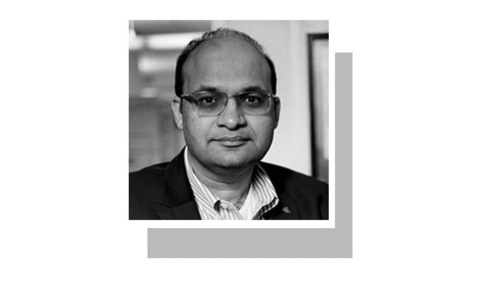A few weeks ago, a news report gave the figure of Pakistanis migrating abroad in 2022 for work-related purposes as 765,000. The bulk of these were in blue-collar occupations, but it seems a significant number of educated and credentialed workers have also decided to seek their economic fortunes elsewhere. Given what one hears anecdotally, the figures could very well be higher than what’s being reported, which explains part of the alarm around this particular issue.
Over a period of 13 years, approximately 70 per cent of those still active in the labour market from my college graduating class have moved abroad, with a large number moving in the last five years. Canada’s liberal immigration policy of the last decade, which allowed skilled, English-fluent workers to obtain residency sans employment sponsorship, has been acutely effective in encouraging upper-middle and upper-class credentialed Pakistanis to move abroad.
There is nothing unique about this. Economic migration is a near-universal phenomenon, especially in developing countries. Labour shortages abroad coupled with weak domestic opportunities combine to create a condition where it’s viable for a section of workers to move in search of higher wages.
Additionally, encouraging workers to migrate remains a varyingly stated and unstated plank of Pakistan’s development strategy since the 1970s. Temporary gulf migrations among blue-collar workers form the bulk of outward migration and they’ve been instrumental in shoring up consumption and inducing some form of social mobility among low and middle-income families. The comparatively better social and economic development of the GT Road belt, from the Peshawar Valley to Central Punjab is, in part, an outcome of Gulf-based remittances.
All the intangibles which may otherwise discourage people from moving abroad — family, sense of community, cultural comfort — are being rendered insufficient.
In recent years, despondent conversations around migration tend to focus more on its inevitability, given the economic stagnation in Pakistan. And here the focus is usually on migration among the relatively better off. For large swathes of the college-educated upper middle class, moving abroad has become a singular ambition, in part encouraged by the effect of seeing peers and seniors create comfortable lives abroad. Nearly every doctor, engineer, computer scientist, or business/corporate professional one speaks to has at least thought about migrating, with a large section actively trying to make it happen.
In the absence of disaggregated data, it’s hard to assert whether the scale of the migration of the relatively better-off is different from what it used to be in the past. After all, Pakistani doctors and engineers have made lives for themselves in the West and elsewhere since the 1970s, so it’s clearly not a new occurrence. Anecdotally, though, it seems that a singular ambition to migrate is far more common now than it was even just a decade and a half ago. The need for a ‘secure passport’ is a frequently cited factor, along with other justifications such as improved services, economic mobility, safety, and better life chances for children.
All of these factors appear to be commonsensical. Given the state of Pakistan’s economy, real wages — even among those with higher earnings — erode at a rapid pace. Saving options are limited to real estate, which may not always be secure, and the idea of a comfortable retirement seems out of reach except for those in privileged public sector employment. Increasingly, it seems that a white-collar person without the good fortune of familial wealth and a housing subsidy from their previous generation is unlikely to save enough to buy a house of their own over the course of their working life.
These are everyday realities that help make migration a singular objective. It also implies that all the intangibles which may otherwise discourage people from moving abroad — family, sense of community, obligation to kin, cultural comfort — are being rendered insufficient. The cost of moving to distant lands and incurring social and cultural discomfort is less than the perceived advantages. Or, at the very least, is less than the continued ignominy of life in Pakistan.
Should the fact of relatively privileged Pakistanis migrating abroad in large numbers be a reason to sound a louder alarm? Privileged people tend to do better in all circumstances, and, it seems accessing foreign residence and employment opportunities is one more strategy to cope with an adverse domestic situation.
But there is a deeper signal here, which requires attention. Supplanting one’s life suggests a trade-off based on some estimation of the future as well. What’s being communicated is not just an estimation of the current situation as adverse, but that there is no hope for improvement in the medium term either. This is an assessment of a historical trend being projected forward, and given the record of the past few decades, it seems to be an entirely accurate one.
The decision of workers who moved abroad in the mid to late-2000s stands validated a decade on. It was the same for those who moved abroad earlier. And there’s no reason to suggest that it will be any different for those moving abroad today.
Contrary to what some may think, expectations of the future among the privileged are not predominantly about what shape the economy will look like in a few years. They are largely about whether the political system is competent enough to fix whatever problems they think afflict the country. More than anything else, the medium-term bet is on political expectations. Will decision-makers be able to steer the ship effectively? Will they be able to make citizens feel more empowered, or at the very least, more secure?
This, in my view, is where the widespread ambition to migrate tells a louder story. Mounting despondency with politics and with those in decision-making has created a situation where even those who are usually shielded from a decrepit economy — through credentials and generational privilege — feel that they may not remain protected for much longer.
The writer teaches politics and sociology at Lums.
Twitter: @umairjav
Published in Dawn, January 9th, 2023














































